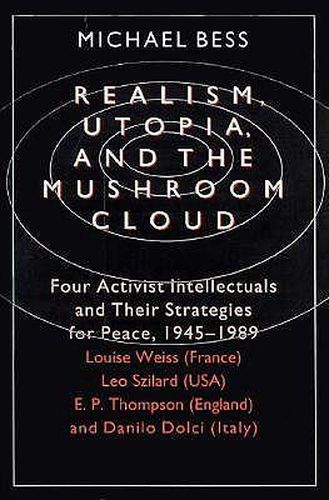Readings Newsletter
Become a Readings Member to make your shopping experience even easier.
Sign in or sign up for free!
You’re not far away from qualifying for FREE standard shipping within Australia
You’ve qualified for FREE standard shipping within Australia
The cart is loading…






How have the weapons of the nuclear age changed the rules of international politics? Can co-operation replace coercion as an instrument of security? This book compares the biographies of four dissident intellectuals who grappled with these questions throughout their careers - Louise Weiss, Leo Szilard, E.P. Thompson, and Danilo Dolci. Though they shared a revulsion for the balance of terror, they possessed sharply divergent visions of a post-Cold War peace, from the Gandhi-like non-violence of Dolci to Szilard’s relentless quest for US-Soviet joint diplomacy. Weiss, a French journalist and realpolitiker, believed that a united European military power would break the Cold War impasse; Szilard, a physicist and father of the atomic bomb, pressed for co-operative diplomacy between the superpowers; Thompson, a British historian, mobilized millions in the grassroots campaign for European Nuclear Disarmament; and Dolci, an Italian poet, experimented with conflict resolution through education and non-violence. By comparing the ideals, successes, and failures of these activists, this book illustrates the problematic boundary between realism and utopianism in the nuclear age.
$9.00 standard shipping within Australia
FREE standard shipping within Australia for orders over $100.00
Express & International shipping calculated at checkout
How have the weapons of the nuclear age changed the rules of international politics? Can co-operation replace coercion as an instrument of security? This book compares the biographies of four dissident intellectuals who grappled with these questions throughout their careers - Louise Weiss, Leo Szilard, E.P. Thompson, and Danilo Dolci. Though they shared a revulsion for the balance of terror, they possessed sharply divergent visions of a post-Cold War peace, from the Gandhi-like non-violence of Dolci to Szilard’s relentless quest for US-Soviet joint diplomacy. Weiss, a French journalist and realpolitiker, believed that a united European military power would break the Cold War impasse; Szilard, a physicist and father of the atomic bomb, pressed for co-operative diplomacy between the superpowers; Thompson, a British historian, mobilized millions in the grassroots campaign for European Nuclear Disarmament; and Dolci, an Italian poet, experimented with conflict resolution through education and non-violence. By comparing the ideals, successes, and failures of these activists, this book illustrates the problematic boundary between realism and utopianism in the nuclear age.